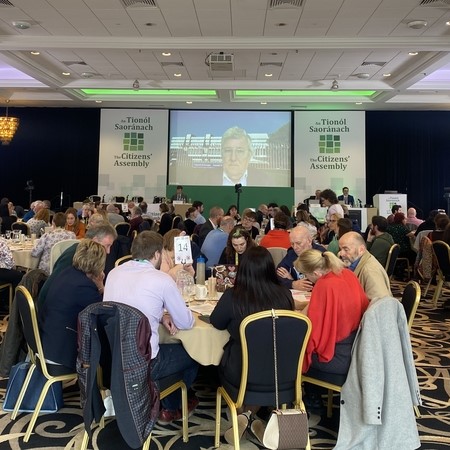Commission recommends that Member States get citizens more involved in policymaking
Member States should introduce citizen-led participatory and deliberative exercises on specific decisions and policies, and support and promote individual and collective ways of participation, such as citizens panels, citizens assemblies, and other dialogue and co-creation formats. Article 11
The Commission adopted today a new Recommendation on promoting the engagement and effective participation of citizens and civil society organisations in public policy-making processes. This Recommendation is part of a comprehensive package that aims at protecting our democracies: The Defence of Democracy Package. It recommends that governments at local, regional and national levels engage citizens in the development of policies. The Commission recommends that EU Member States base citizen participation, including that of young citizens, on sound principles and good practices. This will ensure that engaging citizens in the co-creation and deliberation of policies on issues that matter to the whole of society adds real value to representative democracy. The Recommendation C(2023) 8627 provides principles, guidance and enabling conditions to ensure that carefully designed and high quality participatory processes are useful to the governance of publics' matters of concern.
Promoting citizen participation in the creation of public policy helps governments address divisive and complex issues – see for example, the recent Irish Assemblies on Drugs Use or the French Citizens’ Convention on End of Life. When citizens actively contribute to co-designing solutions and strategies to deal with the complex societal problems they face, they are more likely to trust democratic institutions and take part in everyday democratic life, as suggested by OECD.
Innovative forms of citizen participation, such as online and in-person co-creation and deliberation processes, can contribute to support and renew public governance, by creating spaces whereby citizens’ specific needs, expectations and ideas are known first-hand to policymakers. For example, measures to tackle climate change tailored to their own territories and decisions on infrastructure investments. However, it is not easy for governments to understand how to achieve this. Dedicated capacity building activities are underway to support public administrations on how to conduct high quality citizen participation processes for policymaking.
The Commission's Competence Centre on Participatory and Deliberative Democracy help to develop the Recommendation is based on over 20+ years of research and practical experience in this field, as well as reliance on a strong community of practice that the Competence Centre curates. Also, the Competence Centre is ready to support Member States with guidance and capacity building. Namely, from Spring 2024, a fully-fledged training package will be available to build capacity in EU Public Administrations.
(Recent) Citizen Engagement exercises involving Member States carried out by the CC-DEMOS:
- Biodiversity in cities, 2023: Through a pilot project of the European Parliament, the JRC engaged 10 cities into co-creating the green infrastructure: BiodiverCities project. The project experimented with engagement of citizens in co-creating visions around urban nature, monitoring, and solutions to improve urban biodiversity in the fields of planning and policy-making. The project supports the EU Biodiversity Strategy for 2030.
- Food in schools, 2018: Contemporary policy on this topic is currently placing great emphasis over what children eat, overlooking other aspects that could affect the lived experience of the school meal, as well as its production. This citizen engagement exercise sought to approach the school meal and food procurement in schools beyond nutritional principles in three European countries (Germany, Italy and Portugal), while providing a toolkit for dialogues in schools.
- Dialogues about food, 2015: 100 citizens engaged to interrogate prevalent narratives of food futures at the EXPO 2015 on the same theme.

